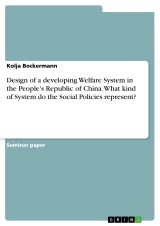Details

Design of a developing Welfare System in the People's Republic of China. What kind of System do the Social Policies represent?
1. Auflage
|
13,99 € |
|
| Verlag: | Grin Verlag |
| Format: | |
| Veröffentl.: | 27.10.2020 |
| ISBN/EAN: | 9783346283559 |
| Sprache: | englisch |
| Anzahl Seiten: | 17 |
Dieses eBook erhalten Sie ohne Kopierschutz.
Beschreibungen
Seminar paper from the year 2020 in the subject Politics - Topic: Development Politics, grade: 1,0, Bielefeld University (Fakultät für Soziologie), course: Social Policy of Developing and Transitioning Countries, language: English, abstract: This work discusses the Welfare System of the People's Republic of China. Chinas economy rose in the 1990 and developed into the worlds largest producer of goods. Furthermore it became increasingly influential in world politics so China started to join the family of countries which have a reasonable and widely available comprehensive System of social protection and welfare. They managed to grand their citizen the ability to prosper and providing basic needs, as well as fundamental social support. In 2010, the National Peoples Congress adopted the first national Social Insurance Law, representing the Culmination of a process of radical social reform and fundamental change in the sphere of Governmental Activities. To Represent the different Goals and Policies of the Welfare System being build in China it is important to understand what kind of welfare regime is being build in the Peoples Republic of China.
China has been a politically unique Country over the last 75 Years. It is one of only five remaining communist states in the world, besides Laos, Cuba, the Democratic Republic of Korea and Vietnam and besides some notable economical achievements from Vietnam, China is the only Communist State which had been economically Successful.
The Characteristics of a Communist State include centralized Power in the hands of a party elite which is presumably motivated, to act in varying degrees by some kind of socialist ideology of statism and social justice.
While the Peoples Republic of China has maintained its political uniqueness, the economic uniqueness of China shed over the last centuries. Mostly because China turned its back on isolationism and adopted due to Reform and Opening Up in the late 1970 and an open socialist market economy, this was enabled by following the Ideology of Deng Xiaopings „Reformation and Modernization“ Polices commonly know as Ideology in Chinese Politics, this Phase still has not Ended regarding to the Communist Party of the Peoples Republic of China Ideology.
China has been a politically unique Country over the last 75 Years. It is one of only five remaining communist states in the world, besides Laos, Cuba, the Democratic Republic of Korea and Vietnam and besides some notable economical achievements from Vietnam, China is the only Communist State which had been economically Successful.
The Characteristics of a Communist State include centralized Power in the hands of a party elite which is presumably motivated, to act in varying degrees by some kind of socialist ideology of statism and social justice.
While the Peoples Republic of China has maintained its political uniqueness, the economic uniqueness of China shed over the last centuries. Mostly because China turned its back on isolationism and adopted due to Reform and Opening Up in the late 1970 and an open socialist market economy, this was enabled by following the Ideology of Deng Xiaopings „Reformation and Modernization“ Polices commonly know as Ideology in Chinese Politics, this Phase still has not Ended regarding to the Communist Party of the Peoples Republic of China Ideology.
Diese Produkte könnten Sie auch interessieren:

Inclusión educativa de niños, niñas y adolescentes migrantes venezolanos, en Colombia

von: Douglas Jiménez

15,99 €
















